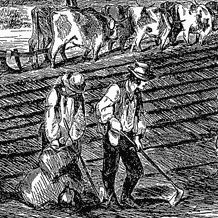John Kerr letter extracts
Letter of John Kerr to his family in Dalry, Ayrshire, giving news about their first year in Illinois. Kerrsland, 2 October 1842:
'With regard to myself, I can now say that I have passed a year in this new world and takeing it all in all I have been quite as healthy as in the old world. I may say the same of Martha … At present we are not so well, it is now the sickly season … As for my trade, it is of little use to me here … About every fourth man around here is or has been a wright and does his own work.'
'Produce is so low at present that it is a hard case for landlords to get shoes for themselves and families … I have raised this year off about 18 acres of land, near 800 bushel of Indian corn, 400 of potatoes, 100 of oats. At present I could not get 10 cents per bushel for them. I have 40 bushel of caster beans, they are worth 40 cents. Last year they sold at 116 cents per bushel. I am going to try and keep my produce to the spring in hopes of geting a better price for it.'
Letter of Hugh Kerr to his brother John Kerr in Paddocks Grove, Illinois. Dalry, 2 February 1845.
'Dear Brother, 'I have observed in more than 1 or 2 of your letters accounts given of hardships endured by landlords: sons going barefoot etc. The greatest recommendation America possesses in my eyes is the plentifulness of land, & while it continues so the landless will be nearly if not quite as well as the proprietors. The fact is land will never be in any place worth as much as a means for accumulating money.'
Two fragments of a letter of John Kerr to his family giving news about their life in America. Paddocks Grove, Illinois, 11 October 1849.
'I will make a remark though a great many will not beleive … men’s work in general is as low paid here or lower than it was about Dalry when I left it … This country is not what it has been represented to be. The representation of some mad dog will hold good if you go back to 1835 and 1836 with regard to wages but not now.'
'I know that you have dull times now, but we have it dull here too … When I left Dalry I thought that by the years end you might find me advising my friends and acquaintances to come on to this land that is said to be flowing with milk and honey. But no I cannot say to you come here and you will be better … wages are hard to get up, the farmer get so little for his produce. I will remark that when I left Dalry the workmen of it were far better clad, had more clothes, lived in far better houses, where better educated and could command far more cash and consequently more of the luxeries of life than the farmers around here may.'

- Prairie plowing
- ['Sabin Americana' collection]
